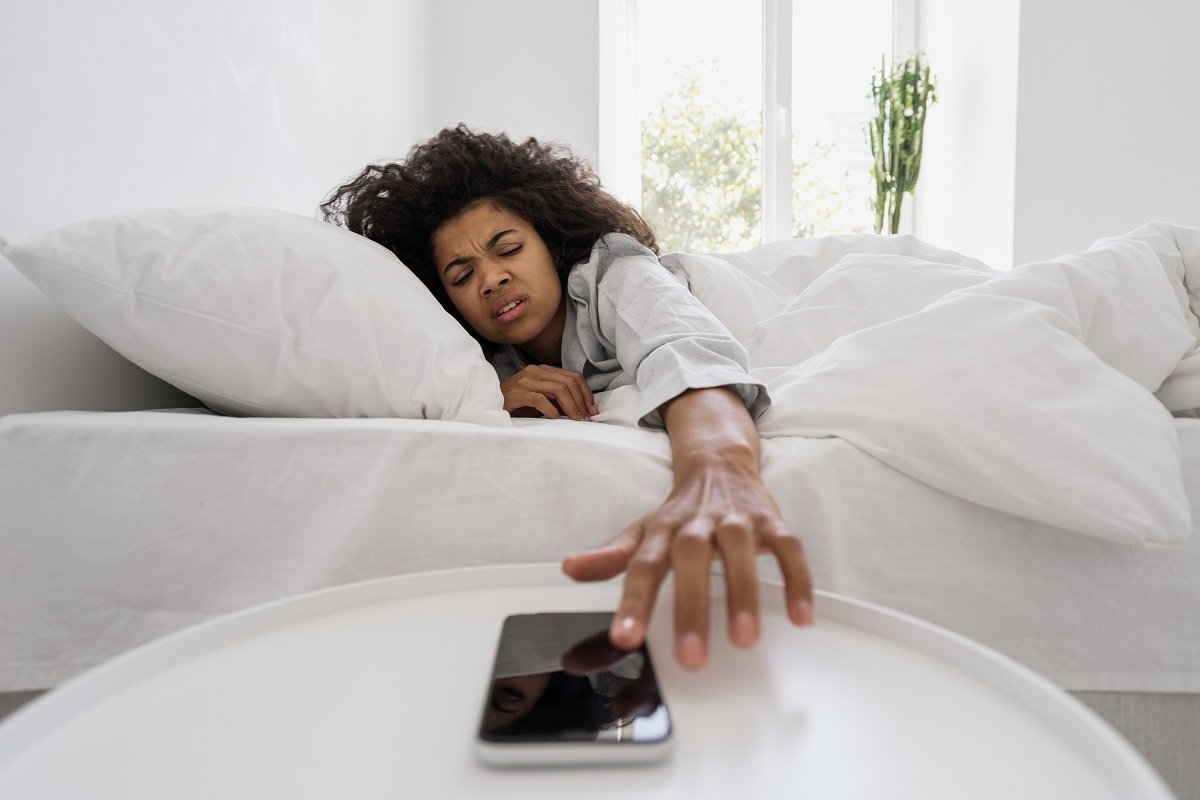Few things in life are worse than the sound of your alarm going off in the morning, jolting you awake just as your dream was getting good.
When the alarm sounds, it's usually easier to hit snooze for 10 minutes; just a little longer in bed won't hurt. But then it goes off again and you're still not ready to get up, so the snooze cycle continues until it really is cutting it close.
Although it can seem like a good way of waking up gradually, sleep medicine specialist and neurologist Dr. Scott Kutscher told Newsweek that repeatedly snoozing an alarm is like "artificially sleep-depriving yourself even more."
The ease of hitting snooze is all too tempting. A YouGov poll in June 2023 revealed that 64 percent of Americans are guilty of choosing this option at some point, with 11 percent admitting that they always do it, while 14 percent do it often.
In contrast, the results showed that 21 percent of the 12,907 participants never snooze their alarm as they can get up straight away instead.

Snoozing Your Alarm Can Prolong Sleep Inertia
Not only does snoozing your alarm have the potential to make you late for work, but Kutscher said that it can also make waking up feel even more difficult.
"The snooze button is the solution to a problem that never needed solving in the first place, because it's a normal sleep phenomenon," he added. "I don't know any sleep doctor who would recommend using a snooze option.
"The problem is that nobody likes waking up in the morning. We might all dream that we wake up twirling out of bed like a Disney princess, but the immediate act of waking up feels bad for almost everyone," Kutscher said. "The term for this is sleep inertia; it's the sensation of being pulled back to sleep, like an undertow pulling you under the ocean."
Sleep inertia is the name given to the grogginess and tiredness felt first thing in the morning. It can be characterized by reduced arousal and impaired behavioral performance immediately after waking.
While it is thought that sleep inertia usually lasts for around 30 minutes, a 2022 study, published in the Journal of Physiological Anthropology, highlighted that snoozing an alarm will actually prolong sleep inertia, rather than decrease it.
The research concluded that snoozing an alarm leads to repeated forced awakenings, rather than experiencing the drowsy state just once and then getting up.
Kutscher added that "sleep inertia tends to be worse when waking up from deeper stages of sleep." So, setting your alarm for earlier than necessary is likely to make it even harder to get out of bed.
"The idea is that after one, or several snoozes, you will be in a lighter stage of sleep, so you'll have less sleep inertia and it will be easier to wake up. Not bad, right? The thing is, in most people, sleep inertia resolves on its own within 30 to 60 minutes of waking, regardless of what stage of sleep you wake up from," Kutscher said.

Snoozing Will Exchange Deep Sleep for Lighter Sleep
Making the decision to press snooze in the morning might feel like the best option, as you tell yourself that you'll feel more rested after those extra 10 minutes. However, according to Kutscher, those precious extra minutes of rest aren't as valuable as actual sleep.
He said: "All snooze is doing is exchanging a deep sleep for lighter sleep. But that deeper sleep, which is usually REM in the early morning, is critical for memory consolidation and executive functioning."
Rapid eye movement sleep, which is commonly referred to as REM, is pivotal for dreaming, emotional processing, and healthy brain development. The Sleep Foundation adds that REM sleep can also help the body prepare to wake up because it activates the central nervous system.
If the idea of snoozing is to help wake you up gradually and reduce the early morning drowsiness, he adds that you're trying to "solve a problem that goes away on its own."
Set an Alarm for as Late as Possible
Rather than hitting snooze several times every morning, Kutscher recommends setting one alarm for the latest possible time and getting up straight away.
He said: "My recommendation to everyone is to set one single alarm for as late as you can reasonably get away with, while still being able to get ready for your day."
If you definitely aren't a morning person, and no amount of coffee seems to lessen the effects of sleep inertia, there are other ways to reduce it naturally. Kutscher suggests using daytime alerting cues, which could be as simple as opening the curtains first thing to let the daylight in or moving around to increase wakefulness.
"My small morning hack is leaving my shoes and socks off until right before I leave for work," Kutscher said. "Cold is another strong alerting signal, and the cold floor on my bare feet helps to wake me up."
Is there a health issue that's worrying you? Let us know via health@newsweek.com. We can ask experts for advice, and your story could be featured on Newsweek.
Uncommon Knowledge
Newsweek is committed to challenging conventional wisdom and finding connections in the search for common ground.
Newsweek is committed to challenging conventional wisdom and finding connections in the search for common ground.
About the writer
Alyce Collins is a Newsweek Life and Trends reporter based in Birmingham, U.K. with a focus on trending topics that ... Read more
To read how Newsweek uses AI as a newsroom tool, Click here.








